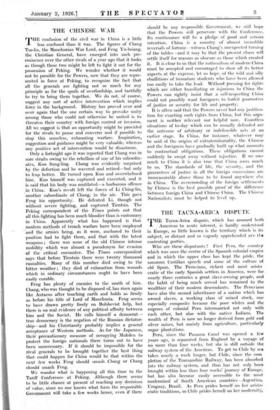THE CHINESE WAR
THE confusion of the civil war in China is a little less confused than it was. The figures of Chang Tso-lin, the Manchurian War Lord, and Feng Yu-hsiang, the Christian General, have emerged into such pre- eminence over the other rivals of a year ago that it looks as though these two might be left to fight it out for the possession of Peking. We wonder whether it would not be possible for the Powers, now that they are repre- sented in force at Peking, to recognize the fact that all the generals are fighting not so much for, any principle as for the spoils of overlordship, and tactfully to try to bring them together. We do not, of course, suggest any sort of active intervention which implies force in the background. History has proved over and over again that the one certain way to provoke unity among those who could not otherwise be united is to threaten their country with foreign control or invasion. All we suggest is that an opportunity might be provided 'for the rivals to pause and converse and if possible to stop this senseless, exhausting warfare. Inspiration, suggestion and guidance might be very valuable, whereas any positive act of intervention would be disastrous.
Only a fortnight ago it was reported that Chang was in sore straits owing to the rebellion of one of his subordin- ates, Kuo Sung-ling. Chang was evidently surprised by the defection and he wavered and retired—but only to leap better. He turned upon Kuo and overwhelmed Kuo himself was captured and executed, and it is said that his body was mutilated—a barbarous offence in China. Kuo's revolt left the forces of Li Ching-lin, another subordinate of Chang, in the air. This gave Feng his opportunity. He defeated Li, though not without severe fighting, and captured Tientsin. The Peking correspondent of the Times points out that all this fighting has been much bloodier than is customary in China. Apparently what has happened is that modern methods of trench warfare have been- employed _ _ -*and the armies being, as it were, anchored to their position had to fight there, and that with the latest weapons ; there was none of the old Chinese intense mobility which was almost a pseudonym for evasion of the critical encounter. The Times correspondent says that before Tientsin there were twenty thousand casualties. Many of this number died owing to the bitter weather ; they died of exhaustion from wounds which in ordinary circumstances ought to have been easily curable.
Feng has plenty of enemies to the south of him. Chang, who was thought to be disposed of, has risen again like Antaeus after touching earth and holds as firmly as before his title of Lord of Manchuria. Feng seems to have drawn pretty freely on Bolshevist help, but there is no real evidence of any political affinity between him and the Soviet. He calls himself a democrat— true democracy is the negation of the Russian dictator- ship—and his Christianity probably implies a general aceeptance of Western methods. As for the Japanese, their precautionary measure of occupying Mukden to protect the foreign nationals there turns out to have been Unnecessary. If it should be impossible for the rival generals to be brought together the best . thing that could happen for China would be that within the next few weeks Feng should smash Chang or Chang should smash Feng.
We wonder what is happening all this time to the Tariff Conference at Peking. Although there seems to be little chance at present of reaching any' decisions of value, since no one knows what form the responsible Government will take a few weeks hence, even if there should be any responsible Government, we still hope that the Powers will persevere with the Conference.
Its continuance will be a pledge of good and serious intention. China is a country of almost incredible reversals of fortune—witness Chang's unexpected turning of the tables—and it may be that the present chaos will settle itself for reasons as obscure as those which created it. It is clear to us that the nationalism of modern China must be accepted and encouraged to show all its better aipects at the expense, let us hope, of the wild and silly ebullitions of immature students who have been allowed too easily to take the lead. Without pressing for rights which are either humiliating or injurious to China the Powers can rightly insist that a self-respecting China could not possibly want foreigners to forfeit guarantees of justice or security for life and property.
It is often said that the Powers never had any justifica- tion for exacting such rights from China, but this argu- ment is neither relevant nor helpful now. Countless situations of to-day which can be morally defended are the outcome of arbitrary or indefensible acts at an earlier stage. In China, for instance, whatever may be said of the origins of extraterritoriality, the Chinese and the foreigners have gradually built up what amounts to contractual obligations. These obligations cannot suddenly be swept away without injustice. If we owe much to China it is also true that China owes much to us. The standards of life, the security, and the guarantees of justice in all the foreign concessions are immeasurably above those to be found anywhere else in China. The overcrowding of the foreign settlements by Chinese is the best possible proof of the difference between foreign China and Chinese China. The Chinese Nationalists must be helped to level up.










































 Previous page
Previous page